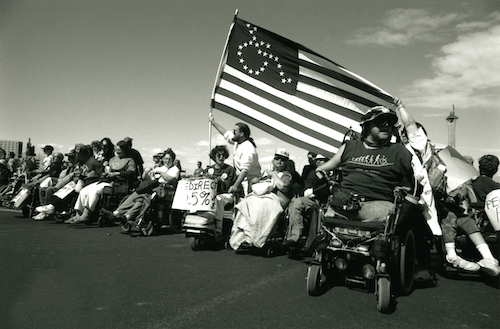Post by Joshua Thorp
The 20th century Disability Rights Movement (DRM) is among the most successful and durable mass protest movements in American political history. Throughout the 20th century, DRM activists fought for equal political and economic rights– the desegregation of classrooms and public accommodations, the dismantling of coercive residential institutions, and an accessible built environment. Disabled activists and their allies occupied warehouses and university campuses, chained themselves to city buses, and took sledgehammers to inaccessible street curbs in an effort to make their voices heard. These remarkable episodes of political cohesion culminated in the 1990 passage of the Americans with Disabilities Act (ADA), a bill heralded by senator Tom Harkin, its chief congressional champion, as “the emancipation proclamation for people with disabilities.”

Used by permission. © Tom Olin Collection, Ward M. Canaday Center for Special Collections, The University of Toledo Libraries.
Despite the prominence of disability in American political history, political scientists have only a thin understanding of how disability shapes political behavior. For the most part, existing research focuses on election accessibility and emphasizes the role of disability in curbing political participation. Several studies find that despite being no less interested in politics, people with disabilities are substantially less likely to turn out to vote than their non-disabled peers.
However, researchers have largely overlooked the potential impact of disability on political psychology. In particular, we don’t know whether disabled Americans see their disability as a politically meaningful feature of their social identities, or whether disability might serve as a basis for political cohesion or collective action. While the history of disability rights activism suggests disability may be politically mobilizing for a small minority of activists, less is known about whether or to what extent disability may also shape political identity in the mass public.
In a recent working paper, I find that disability is indeed an important dimension of political identity for many disabled Americans.
While disabled Americans do not appear mobilized along party lines, a sense of belonging to the disability community is associated with ideological liberalism and support for a range of social and redistributive policies.
Measuring disability as a social identity
I used an online survey of 700 Americans with disabilities to investigate two questions: Who embraces disability as a social identity? And how does identifying as a person with disability shape political attitudes? To collect the sample for this study fielded by Forthright Panels, I screened participants using the same measure of functional disability used by the U.S. Census and the CDC. I asked respondents a range of questions about their everyday experience of disability. I asked them how old they were when they first acquired their disability, how visible or noticeable their disability is by others, and how much functional limitation they experience in everyday life. Then, I asked respondents a series of questions about the degree to which their disability shapes their social identity: their sense of who they are as individuals and their place in the social world.
I compiled these items into a new measure of disability as a social identity– what I call the “Disability ID” scale. Those who score higher on the Disability ID scale consider disability to be an important feature of their personal identity, and place a high value on belonging to the disability community. A sizable minority of Americans with disabilities, about 35%, fall “high” on this scale.
Who embraces disability as a social identity?
I looked at the various characteristics that are associated with higher scores on the Disability ID scale. This analysis yielded two main findings. First, Disability ID is closely tied to impairment characteristics. Respondents with more severe, visible, and long-standing impairments were all more likely to report strong Disability ID. Second, Disability ID is stronger among those who participate in social and political institutions for people with disabilities. Specifically, Disability ID was stronger among those who reported receiving disability accommodations at school or at work, and among those who reported receiving financial assistance from the government on account of their disability.
How does Disability ID shape political attitudes?
Next, I wanted to understand how Disability ID shapes political outcomes. I first looked at the relationship between Disability ID and two key outcomes of interest to political scientists: ideology (liberal or conservative), and partisanship (Democrat or Republican).
The results of this analysis were intriguing. On the one hand, those higher in Disability ID tend to be more politically liberal. On the other hand, Disability ID has no discernible impact on political partisanship. In other words, those who identify strongly with their disability tend to support ideas often associated with liberalism, like government support for social services, but aren’t more likely to identify as Democrats.
I also wanted to understand the potential impacts of Disability ID on policy preferences. Given the particular forms of social and economic disadvantage that accompany disability, I predicted that Disability ID would be associated with support for government policies aimed at improving material well-being for people with disabilities. To test this prediction, I asked participants a series of questions about their level of support for a variety of social and redistributive policies.
A clear pattern of results emerged. Disability ID is strongly positively associated with support for a range of redistributive policies, especially those aimed at increasing financial security, public safety, and access to healthcare. In fact, in several instances the magnitude of the effect of Disability ID on policy attitudes is similar to that of explicitly political variables, such as political partisanship and ideology. On the other hand, Disability ID has relatively little impact on attitudes toward policies theoretically more peripheral to disabled Americans, such as public schools or border security.
Validity testing
To test the validity of these results, I conducted a similar analysis using data from the 2022 Cooperative Election Study (CES), a prominent national political survey fielded by YouGov and researchers from Harvard University. Unlike the Forthright Panels study, the CES survey was collected in two waves, where the same set of participants were interviewed before and after the 2022 midterm elections. I included questions about Disability ID on the pre-election survey fielded in the fall, and questions about policy attitudes on the post-election survey fielded in January 2023. This survey design allowed me to conduct a stronger test of the relationship between Disability ID and policy attitudes. By asking participants about their policy preferences in the post-election survey, I am able to observe the relationship between Disability ID and political attitudes in a context where participants have not already been primed to think about their disability.
Results from the CES mirror those found in the Forthright study. Again, Disability ID is strongly positively associated with support for redistributive policies, most notably those aimed at increasing financial security and access to healthcare. Furthermore, as in the Forthright Study, the magnitude of these effects is often similar to that of explicitly political variables, such as political partisanship and ideology.
Why does this matter?
These results should encourage researchers to think differently about the role of disability in shaping political behavior. More than 30 years after the passage of the ADA, disability remains an important dimension of socioeconomic inequality and disadvantage. People with disabilities are roughly twice as likely as their non-disabled peers to be unemployed and living in poverty, and are nearly four times as likely to be victims of violent crime. Addressing these inequalities is likely to require political engagement and collective action. While existing work has emphasized the role of disability in curbing political participation, these results suggest that for many disabled Americans, a shared social identity as members of the disability community may be an important source of political cohesion and empowerment.
 Joshua Thorp is a PhD candidate in Political Science at the University of Michigan. His research focuses on political psychology in the United States and other developed democracies, with a particular focus on the politics of disability. Thorp’s dissertation examines disability as a dimension of political identity in the United States. He is an Institute for Social Research Next Generation scholar at the Center for Political Studies, and was the recipient of the 2022 Converse-Miller fellowship in American political behavior.
Joshua Thorp is a PhD candidate in Political Science at the University of Michigan. His research focuses on political psychology in the United States and other developed democracies, with a particular focus on the politics of disability. Thorp’s dissertation examines disability as a dimension of political identity in the United States. He is an Institute for Social Research Next Generation scholar at the Center for Political Studies, and was the recipient of the 2022 Converse-Miller fellowship in American political behavior.
The Forthright survey was generously funded by the Center for Political Studies (CPS) and the Rapoport Family Foundation. The CES data was collected as part of the University of Michigan team module of the Cooperative Election Study at CPS, led by Donald Kinder.
Tevah Platt and Julia Lippman contributed to the development of this post.

